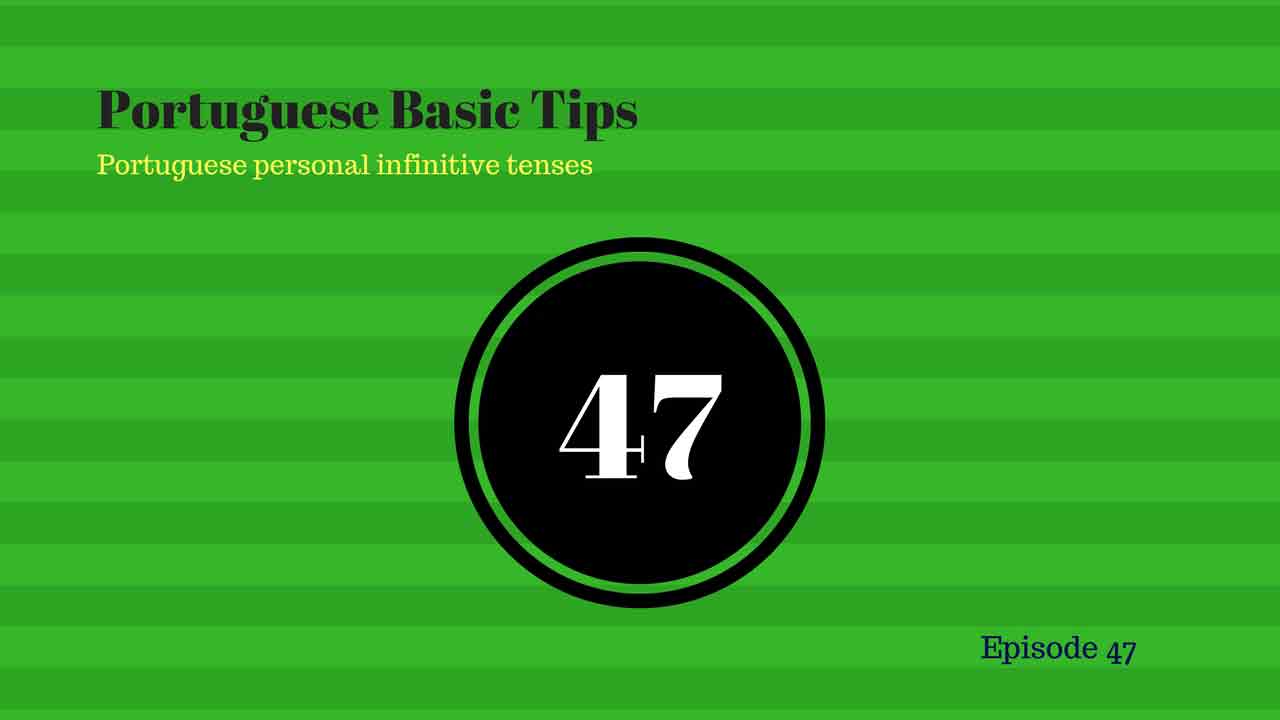Brazilian Portuguese personal infinitive tenses

Brazilian Portuguese personal infinitive tenses
Welcome to our Portuguese Basic Tips 47 about Portuguese personal infinitive tenses
On today’s podcast, we are going to speak about Portuguese personal infinitive tenses. This topic is still simple to understand, but I’m afraid we’re beginning to distant ourselves from the main focus on this podcast, which is Portuguese Basic Tips. Today we’ll need to get closer in grammar studies, so I’ll try to give you lots of examples in order to simplify this process.
Click on the link to visit our episode about Portuguese past perfect tense
When we say that we have a verb in the infinitive form in Portuguese, we generally want to say that this verb ends with “ar”, “er” or “ir”.
For instance: comprar (to buy), vender (To sell) and partir (to leave).
These verbs are not conjugated, yet we can create some sentences with them.
For instance:
- Comprar coisas com antecedência pode ser bom (Buying things in advance can be good)
- Vender essas coisas seria melhor ainda. (Selling those things would be even better)
- Partir depois de tudo isso seria um sonho. (Leaving after that would be a dream).
Note that in those cases, we don’t know who is practicing the act of “comprar”, “vender” and “partir”. We just know it would be good to do that. We could try to add Portuguese personal infinitive tenses and then identify who we’re talking about.
Click on the link to visit our previous episode about informal ways of using the verb dar in Portuguese
For instance:
- Comprarmos coisas com antecedência seria bom.
By simply using Portuguese personal infinitive with the verb “comprar”, we can know we’re speaking about “us”. I could translate that as “It would be good if we bought things in advance.”
- Vendermos essas coisas seria melhor ainda (If we sold those things, would be even better)
- Partirmos depois de tudo isso seria um sonho (It would be a dream if we leave after that).
Common expressions using Portuguese personal infinitive tenses
Ok, now that you know how it works, I can say some common expressions you’ll find in Portuguese that use this way of thinking.
Expressions like “It’s necessary” (É necessário)
For instance:
- É necessário fazer isso / É necessário fazermos isso (Using personal infinitive) – It’s necessary that we do that
Expressions with “It’s good or it would be good” (É bom ou seria bom)
- É bom fazer isso (generic) / É bom fazermos isso (It’s good that we do that) – Portuguese personal infinitive
In some cases, you could listen to some people that use the second person (tu).
For instance:
É difícil fazer isso (Generic) / É difícil fazeres isso (It is difficult for you to do that) – Portuguese personal infinitive tense.
Para / In order to
There is this expression that is very used in Brazil.
At this episode’s page, you’ll find a table containig conjugations with the verbs “falar”(to speak), “beber”(to drink) and “sorrir”(to simile) but I suggest you try to practice it with other verbs.
Click here to visit our podcast about Ir and vir conjugations in Portuguese
Note, that when we use the first person (Eu) and the third person (ele), we don’t modify the conjugation. In those cases, if you want to emphasize that you are using Portuguese personal infinitives, you really need to use them accompanied by a personal pronoun.
For instance:
Isso é para falar (generic) / Isso é para eu falar (This is for me to speak) Portuguese personal infinitive tense
Isso é para beber (generic) / Isso é para ele beber (This is for him to drink).
Portuguese personal infinitive tenses
| Portuguese personal infinitive tenses
Para – In order to |
Falar (To speak) |
Beber (To drink) |
Sorrir (To smile) |
| Para eu | Falar | Beber | Sorrir |
| Para tu | Falares | Beberes | Sorrires |
| Para ele
Para ela Para você Para o senhor Para a senhora Para a gente |
Falar |
Beber |
Sorrir |
| Para nós | Falarmos | Bebermos | Sorrirmos |
| Para eles
Para elas Para vocês Para os senhores Para as senhoras |
Falarem |
Beberem |
Sorrirem |
Become a Premium Member to download our transcripts
Click on the link to visit this website containing a forum with more conjugations
That’s enough for today!
See you next time
Thanks!
Marcos Sales
Podcast (portuguesebasictips): Play in new window | Download







Recent Comments